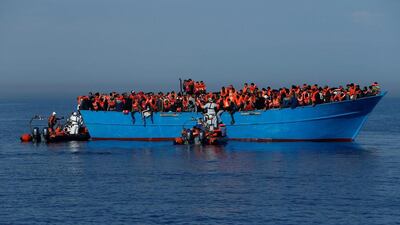BRUSSELS // Humanitarian groups that have rescued thousands of African migrants making a dangerous sea crossing to Europe are under increasing pressure from European officials, accused of acting as a “ferry service” that encourages unscrupulous people smugglers.
For European Union officials, the debate about the role of aid groups in the Mediterranean highlights their dilemma between the moral and legal obligation of helping those in need, and growing pressure from voters to keep them away.
Escaping wars and poverty, more than 360,000 refugees and migrants reached Europe shores last year, most of them on rescue vessels. Thousands more have drowned at sea, loaded by human traffickers on to boats unsuitable for the long journey between Libya and Italy.
The EU’s approach has increasingly shifted towards keeping people away, drawing widespread condemnation from rights groups but going some way to soothing nervous voters. One official in Brussels said there was no choice but to take the NGOs to task.
“We can’t avoid doing it. As much as it is harmful to the migrants. With the NGOs operating so close to the Libyan shores, it is tantamount to providing a ferry service,” the official said.
“It’s almost as if the smugglers were putting people directly on NGO boats.”
Appalled by the loss of life, aid groups such as Medecins Sans Frontieres (MSF), MOAS, Sea Watch, SOS Mediterranee, Sea Eye, Jugend Rettet, Save the Children and others have stepped up their search and rescue operations and moved closer to the Libyan coast.
That is further south than EU, Nato and merchant vessels are prepared to go because of legal, security and political concerns.
MSF says the move is essential for saving more lives.
“If you want to have an impact, you have to be able to rescue them as close to the shore as possible,” said Aurelie Ponthieu of MSF.
The subject is being debated around the EU. Belgium’s migration minister, Theo Francken said in March that MSF was encouraging people smugglers, earning him a swift rebuke from his prime minister Charles Michel who told him to “respect humanitarian work”.
Aid groups deny helping people smugglers in any way.
The main route for African migrants to Europe claimed nearly 4,600 lives last year and about 1,300 so far this year, according to UN data.
A further 50,000 people were rescued last year from capsized boats or overcrowded dinghies, EU border agency Frontex said.
MSF and other NGOs stepped up their rescue efforts in the last migratory season, which starts in the spring when the seas are calmer, and moved them closer to shore.
Frontex says this has allowed people smugglers to maximise their profits by using flimsier boats, providing tiny amounts of fuel or food, and sometimes removing the engines, resulting in more casualties.
The agency called for the role of the NGOs to be examined.
Authorities in the Italian port of Catania have opened an investigation into the role of NGOs. When chief prosecutor, Carmelo Zuccaro, first launched the probe in February, he said he was looking for any signs of collusion between NGOs and people smugglers.
The Italian parliament is also looking into the role of the NGOs in the search and rescue operations near the Libyan coast.
“We have to strike the right balance between saving lives and making sure our actions don’t fuel a criminal business by encouraging criminals to adapt their modus operandi to the fact that there will be vessels approaching Libya,” Frontex head Fabrice Leggeri said.
Mr Leggeri said nearly half of all search and rescue operations were now carried out by NGOs, making it harder for governments to control the process.
“My point was not to blame the NGOs or to blame anybody. It was just to highlight facts. The paradox we have is that in 2016 there was the highest number of vessels patrolling there. Nevertheless, we also had the highest number of casualties,” he said.
MSF and other aid groups involved in search and rescue operations (SARs) say their only goal is to save lives.
“We are doing proactive SARs, not sitting back and waiting for when it’s too late. None of these boats will make it. It’s a matter of hours before these people die or drown,” said Ms Ponthieu.
But many EU officials say the NGOs are encouraging the flow, even if unwittingly.
“We have always seen these rescue operations as a pull factor. If migrants know they will be rescued, they will come,” said one EU diplomat in Brussels.
The NGOs say they are being made the scapegoat for the EU’s own failure to manage migration as politicians tap into higher anti-immigration sentiment among voters.
Deputy head of the EU’s executive arm, Frans Timmermans has come out strongly on the side of the NGOs.
“Saving lives at sea and looking after vulnerable people ... is not the same as promoting irregular migration,” he said last month.
“There is no evidence whatsoever of NGOs working with criminal smuggling networks to help migrants enter into the EU.”
* Reuters

